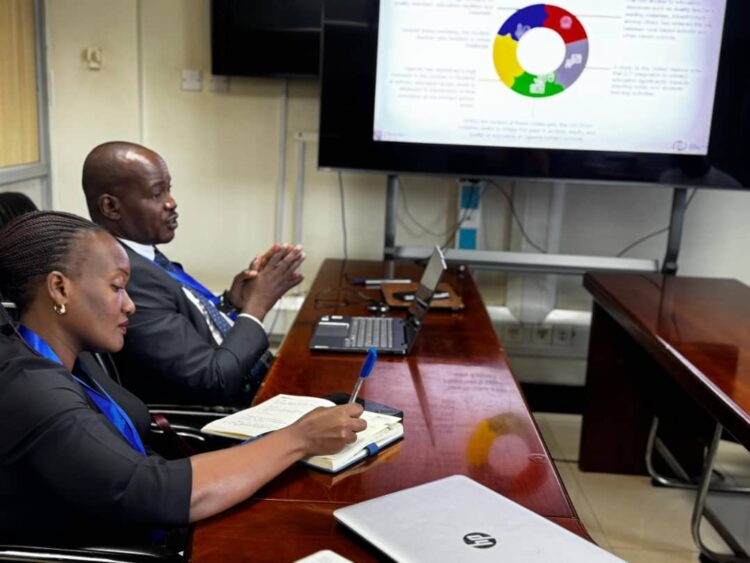To bridge the digital divide and enhance early childhood learning outcomes across the country, Uganda Communications Commission (UCC), through the Uganda Communications Universal Service and Access Fund (UCUSAF), has partnered with Nkumba University in a project aimed at transforming education in underserved primary schools through Information Communications Technology (ICT).
Dubbed “Advancing Digital Learning for Primary Schools in Uganda: A Digitally Enabled Community-Centered Early-Childhood Development Approach (DECEDA),” the initiative is spearheaded by Prof Jude T. Lubega, the Vice Chancellor, Nkumba University.
Prof. Lubega says, the project seeks to address glaring inequalities in education quality, particularly in rural areas, by leveraging information and communication technology (ICT) in teaching and learning. “This project will serve as a pioneering national educational reform model designed to empower primary school teachers with the essential skills to effectively integrate ICT into their teaching practices. “It speaks directly to Uganda’s National Development Plans III and IV, which emphasize ICT integration to in National Development.”
The need for the project became vividly evident in the wake of the COVID-19 pandemic, which exposed major gaps in digital learning across the country. According to Prof Lubega, “The pandemic highlighted how fragile and unequal our education system can be without digital support. We now have an opportunity to fix that.”
With internet penetration now standing at 52%, mostly through mobile access, Uganda has a strong foundation for digital expansion. Yet, rural schools lag far behind, burdened by poor infrastructure, a lack of digital tools, and alarmingly high pupil-teacher ratios often exceeding 70 pupils per teacher.
The DECEDA project aims to reach 30 primary schools across all five regions of Uganda and impact over 100 others. Each school will involve three to five teachers and will be selected based on the severity of digital and educational disparities.
“The goal is simple but profound: every child, regardless of where they are born, should access quality education from a well-trained teacher, aided by technology,” explained Prof Lubega.
The implementation will follow a multi-pronged approach built around ten comprehensive work packages. These range from stakeholder engagement and teacher training to digital content development and platform enhancement.
Stakeholder mobilization is already underway, with the project team working closely with teachers, school administrators, local communities, NGOs, policymakers, and the private sector. “We believe in inclusiveness,” said Prof Lubega. “Change happens when communities own the process.”
One of the central innovations of the project is the redevelopment of the HELP Platform an online collaborative learning space. Through agile design and testing, it will support real-time resource sharing, data management, and monitoring and evaluation.
Teacher capacity building will play a vital role, with a blended learning approach combining face-to-face workshops and online training via the platform. Advanced training sessions and mentorship through a ‘Trainers of Trainers’ model will ensure sustainability.
The project also promises localized digital content tailored to the national curriculum. Teachers will be trained to deliver live lessons, and under-resourced schools will receive infrastructure support, including computers, whiteboards, and internet access.
To encourage collaboration, well-resourced schools with robust ICT facilities will act as regional hubs or anchor schools. “This hub model ensures that the benefits of the project cascade down to the most remote learners,” Prof Lubega noted.
A professional peer support network for teachers will also be established, alongside a robust knowledge management and communication framework to document best practices.
Monitoring and evaluation will be embedded throughout the project lifecycle. Progress reports, risk assessments, and data-driven insights will guide the implementation to ensure impactful results.
Ultimately, DECEDA aligns with Sustainable Development Goal 4 (Quality Education), aiming to make learning inclusive, engaging, and effective for all.
“If we are to achieve SDG 4, we must demystify the notion that quality education is only for the privileged,” Prof Lubega emphasized. “With DECEDA, we intend to show that ICT is not a luxury, it’s a necessity.”
The university has called for continued collaboration from all stakeholders to ensure the successful rollout and long-term impact of the project ahead of the needs assessment commencing on 23rd June 2025.





















Discussion about this post